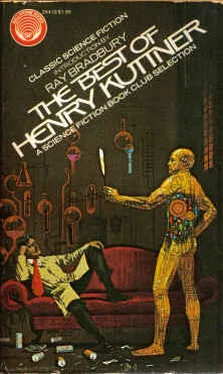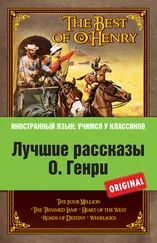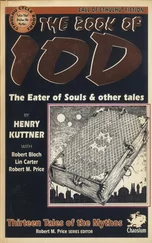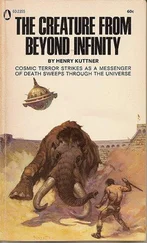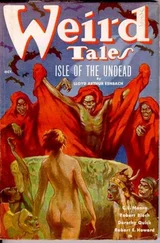All of this makes it dreadfully sad to consider Henry Kuttner’s early death. He had what we all admire and respond to: a of ideas and a love of literature. He was not one of those easy cynics who move into magazines or television for the fast buck. When he did write for money, he was not happy.
He was truly happy moving about through libraries, discovering new writers, finding new angles on human activity put forward by psychologists or scientists in any field. He was beginning to experiment with stories, some of which you will find in this collection, having to do with robot personalities, computerized intellects, and men lost among those machines.
I wish he could have lived into the Kennedy-Johnson-Nixon years, the years when the computers really arrived on-scene, the years of incredible paradox when we footprinted the moon and inched toward the stars. Kuttner, being nonpolitical, thank God, would have given us insights into our political-technological cultures that most of our “in” writers lack because they lean right or left. Kuttner never belonged to anything. He belonged, finally, to all of us. In a polarized world, we need fewer Mailers and many more Kuttners.
This brings us back to the problem of why Kuttner’s name remains semi-obscure in our genre.
Politics is certainly part of the answer. When you mention Vonne gut, you polarize on the instant.
Orwell, similarly. And Heinlein and Wells, and even Verne. Verne, after all, invented mad Nemo, the mirror-image reversal of mad Ahab. Nemo prowled the world teaching moral lessons to even madder militarists. Beyond this, Verne was a superpropagandist for the humanities who said: you have a head, use it to guide your heart; you have a heart, use it to guide your head; you have hands with which to change the world. Head, heart, hands-sum up all three, and remake Eden.
Most science-fiction writers are moral revolutionaries on some level or another, instructing us for our own good. When Bernard Shaw and Bertrand Russell ventured into the field it could have been predicted (and I did so predict with Lord Russell) that they would pop up as moral revolutionists teaching lessons and pontificating therefrom. Shaw was better at it, of course. Russell came late to the short story, but it was science fiction, and was odorous with morality.
Here, I think, we may find Kuttner’s flaw — if flaw it is, and I for one do not consider it so. One cannot be polarized all the time, one cannot think politically from noon to night. That way is the way of the True Believer — that is to say, finally, the Mad Man.
Kuttner is not mad, nor especially kicking up his heels with joie de vivre. He is wryly calm. If he celebrates anything, it is within his head.
I cannot recall any particularly violent ideas he put forth on politics or politicians. He seemed never to have gone through one of those nineteenth or twentieth summers when we all go a bit amok on Technocracy or Socialism or Scientology. When the fever passes and the smoke clears we wonder what happened to us and are puzzled when our friends don’t speak to us for a time, until they discover that the hair has fallen off us and we have given up being a political gorilla and are back being human again. If Kuttner had such a year, or month, I never knew it. And it doesn’t show in his work.
So because much of what he wrote is not, in modern terminology, Relevant with a capital R, he is probably graded by some as ten degrees down from Orwell, and twenty below Vonnegut — which is, needless to say, a damned and awful shame. What we need is not more political cant and polarized bias, but more traffic engineers, with no particular traffic in mind save survival, to stand on the highroads leading toward the future, waving us on creatively but not necessarily banging our ears when we, children that we are, misbehave.
Kuttner, then, was no moral revolutionary or political reformer. He was an entertaining writer. His stories are seeded with ideas and moralities, yes, but these do not cry out, shout, shriek, or necessarily ask for change. This is the way we are, Kuttner says, what do you think of us?
And so, the more I think of it, the more I feel Kutiner has been cursed by the great curse of our time.
People have too often asked: Well, how do we use Kuttner? What’s he good for? What kind of tool is he? Where does he fit? What is the appropriate label? Will people look up to me if I carry “Mimsy Were the Borogoves” around campus rather than The Gulag Archipelago?
If this is not the complete explanation, it leans toward it, in any event. In what tends to be a practical Kleenex culture, if you can’t clean out your ears with an author, you tend, because others bully you about it, to leave him alone.
So if you have arrived at this book and look to Kuttner for religious instruction, secular improvement, or moral renovation, save with certain exceptions you had best retreat to Siddhartha and other forms of literate navel-lint plucking with which the sophomores of the world bug each other.
Kuttner will not kick, bite, beat, much less kiss, hug, stroke, or improve you. And thank God for that. I have had enough improvement, just as I have had too much cotton candy at too many circuses.
If you will allow a final, very small, very personal note, here it is: Back in 1942 you will find my first horror story, published in the November issue of Weird Tales. Its title is “The Candle,” and the last three hundred words were written by Henry Kuttner. I had trouble with the story, sent it to Hank, and he responded with a complete ending. It was good. I couldn’t top it. I asked permission to use it. Hank said yes. That ending, today, is the only good part of that long-lost and deservedly well-buried story. It’s nice to be able to say Henry Kuttner once collaborated with me.
Well, here’s the collection. It represents only a small part of the hundreds of stories he wrote.
Kuttner had no family, but…
His children live here in this book.
They are lovely and special and fine.
I want you to meet them.
Ray BRADBURY Los Angeles, California July 11, 1974
There’s no use trying to describe either Unthahorsten or his surroundings, because, for one thing, a good many million years had passed and, for another, Unthahorsten wasn’t on Earth, technically speaking. He was doing the equivalent of standing in the equivalent of a laboratory. He was preparing to test his time machine.
Having turned on the power, Unthahorsten suddenly realized that the Box was empty. Which wouldn’t do at all. The device needed a control, a three-dimensional solid which would react to the conditions of another age. Otherwise lJnthahorsten couldn’t tell, on the machine’s return, where and when it had been. Whereas a solid in the Box would automatically be subject to the entropy and cosmic-ray bombardment of the other era, and Unthahorsten could measure the changes, both qualitative and quantitative, when the machine returned. The Calculators could then get to work and, presently, tell Unthahorsten that the Box had briefly visited A.D. 1,000,000, A.D. 1000 or A.D., as the case might be.
Not that it mattered, except to Unthahorsten. But he was childish in many respects.
There was little time to waste. The Box was beginning to glow and shiver. Unthahorsten stared around wildly, fled into the next glossatch and groped in a storage bin there. He came up with an armful of peculiar-looking stuff. Uh-huh. Some of the discarded toys of his son Snowen, which the boy had brought with him when he had passed over from Earth, after mastering the necessary technique.
Well, Snowen needed this junk no longer. He was conditioned, and had put away childish things.
Besides, though Unthahorsten’s wife kept the toys for sentimental reasons, the experiment was more important.
Читать дальше
